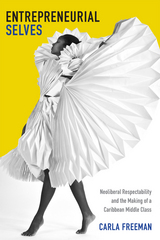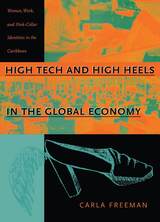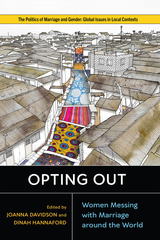3 books about Freeman, Carla

Entrepreneurial Selves
Neoliberal Respectability and the Making of a Caribbean Middle Class
Carla Freeman
Duke University Press, 2014
Entrepreneurial Selves is an ethnography of neoliberalism. Bridging political economy and affect studies, Carla Freeman turns a spotlight on the entrepreneur, a figure saluted across the globe as the very embodiment of neoliberalism. Steeped in more than a decade of ethnography on the emergent entrepreneurial middle class of Barbados, she finds dramatic reworkings of selfhood, intimacy, labor, and life amid the rumbling effects of political-economic restructuring. She shows us that the déjà vu of neoliberalism, the global hailing of entrepreneurial flexibility and its concomitant project of self-making, can only be grasped through the thickness of cultural specificity where its costs and pleasures are unevenly felt. Freeman theorizes postcolonial neoliberalism by reimagining the Caribbean cultural model of 'reputation-respectability.' This remarkable book will allow readers to see how the material social practices formerly associated with resistance to capitalism (reputation) are being mobilized in ways that sustain neoliberal precepts and, in so doing, re-map class, race, and gender through a new emotional economy.
[more]

High Tech and High Heels in the Global Economy
Women, Work, and Pink-Collar Identities in the Caribbean
Carla Freeman
Duke University Press, 2000
High Tech and High Heels in the Global Economy is an ethnography of globalization positioned at the intersection between political economy and cultural studies. Carla Freeman’s fieldwork in Barbados grounds the processes of transnational capitalism—production, consumption, and the crafting of modern identities—in the lives of Afro-Caribbean women working in a new high-tech industry called “informatics.” It places gender at the center of transnational analysis, and local Caribbean culture and history at the center of global studies.
Freeman examines the expansion of the global assembly line into the realm of computer-based work, and focuses specifically on the incorporation of young Barbadian women into these high-tech informatics jobs. As such, Caribbean women are seen as integral not simply to the workings of globalization but as helping to shape its very form. Through the enactment of “professionalism” in both appearances and labor practices, and by insisting that motherhood and work go hand in hand, they re-define the companies’ profile of “ideal” workers and create their own “pink-collar” identities. Through new modes of dress and imagemaking, the informatics workers seek to distinguish themselves from factory workers, and to achieve these new modes of consumption, they engage in a wide array of extra income earning activities. Freeman argues that for the new Barbadian pink-collar workers, the globalization of production cannot be viewed apart from the globalization of consumption. In doing so, she shows the connections between formal and informal economies, and challenges long-standing oppositions between first world consumers and third world producers, as well as white-collar and blue-collar labor.
Written in a style that allows the voices of the pink-collar workers to demonstrate the simultaneous burdens and pleasures of their work, High Tech and High Heels in the Global Economy will appeal to scholars and students in a wide range of disciplines, including anthropology, cultural studies, sociology, women’s studies, political economy, and Caribbean studies, as well as labor and postcolonial studies.
Freeman examines the expansion of the global assembly line into the realm of computer-based work, and focuses specifically on the incorporation of young Barbadian women into these high-tech informatics jobs. As such, Caribbean women are seen as integral not simply to the workings of globalization but as helping to shape its very form. Through the enactment of “professionalism” in both appearances and labor practices, and by insisting that motherhood and work go hand in hand, they re-define the companies’ profile of “ideal” workers and create their own “pink-collar” identities. Through new modes of dress and imagemaking, the informatics workers seek to distinguish themselves from factory workers, and to achieve these new modes of consumption, they engage in a wide array of extra income earning activities. Freeman argues that for the new Barbadian pink-collar workers, the globalization of production cannot be viewed apart from the globalization of consumption. In doing so, she shows the connections between formal and informal economies, and challenges long-standing oppositions between first world consumers and third world producers, as well as white-collar and blue-collar labor.
Written in a style that allows the voices of the pink-collar workers to demonstrate the simultaneous burdens and pleasures of their work, High Tech and High Heels in the Global Economy will appeal to scholars and students in a wide range of disciplines, including anthropology, cultural studies, sociology, women’s studies, political economy, and Caribbean studies, as well as labor and postcolonial studies.
[more]

Opting Out
Women Messing with Marriage around the World
Joanna Davidson
Rutgers University Press, 2023
Women around the world are opting out of marriage. Through nuanced ethnographic accounts of the ways that women are moving the needle on marital norms and practices, Opting Out reveals the conditions that make this widespread phenomenon possible in places where marriage has long been obligatory. Each chapter invites readers into the lives of particular women and the changing circumstances in which these lives unfold - sometimes painfully, sometimes humorously, and always unexpectedly. Taken together, the essays in this volume prompt the following questions: Why is marriage so consistently disappointing for women? When the rewards of economic stability and the social status that marriage confers are troubled, does marriage offer women anything compelling at all? Across diverse geographic contexts in Africa, Asia, and Latin America, this book offers sensitive and powerful portrayals of women as they escape or reshape marriage into a more rewarding arrangement.
[more]
READERS
Browse our collection.
PUBLISHERS
See BiblioVault's publisher services.
STUDENT SERVICES
Files for college accessibility offices.
UChicago Accessibility Resources
home | accessibility | search | about | contact us
BiblioVault ® 2001 - 2024
The University of Chicago Press









